The Impact of Cultural Narratives on Gender Roles and Expectations
VerifiedAdded on 2023/06/03
|7
|1741
|390
Essay
AI Summary
This essay delves into the intricate relationship between cultural narratives and gender roles, exploring how societal expectations shape our understanding of masculinity and femininity. It examines the historical context of gender roles, highlighting the influence of patriarchal societies and traditional norms passed down through generations. The author reflects on personal experiences within a patriarchal society, illustrating how societal pressures and expectations impact individual perceptions of gender. The analysis further investigates the role of gender norms as social determinants of health, noting instances of gender discrimination and marginalization. While acknowledging the challenges faced by women, the essay also considers the pressures and expectations placed on men, emphasizing the importance of responsibility and the burdens they often carry. The essay concludes by advocating for a more equitable society that transcends traditional gender boundaries and promotes inclusivity.
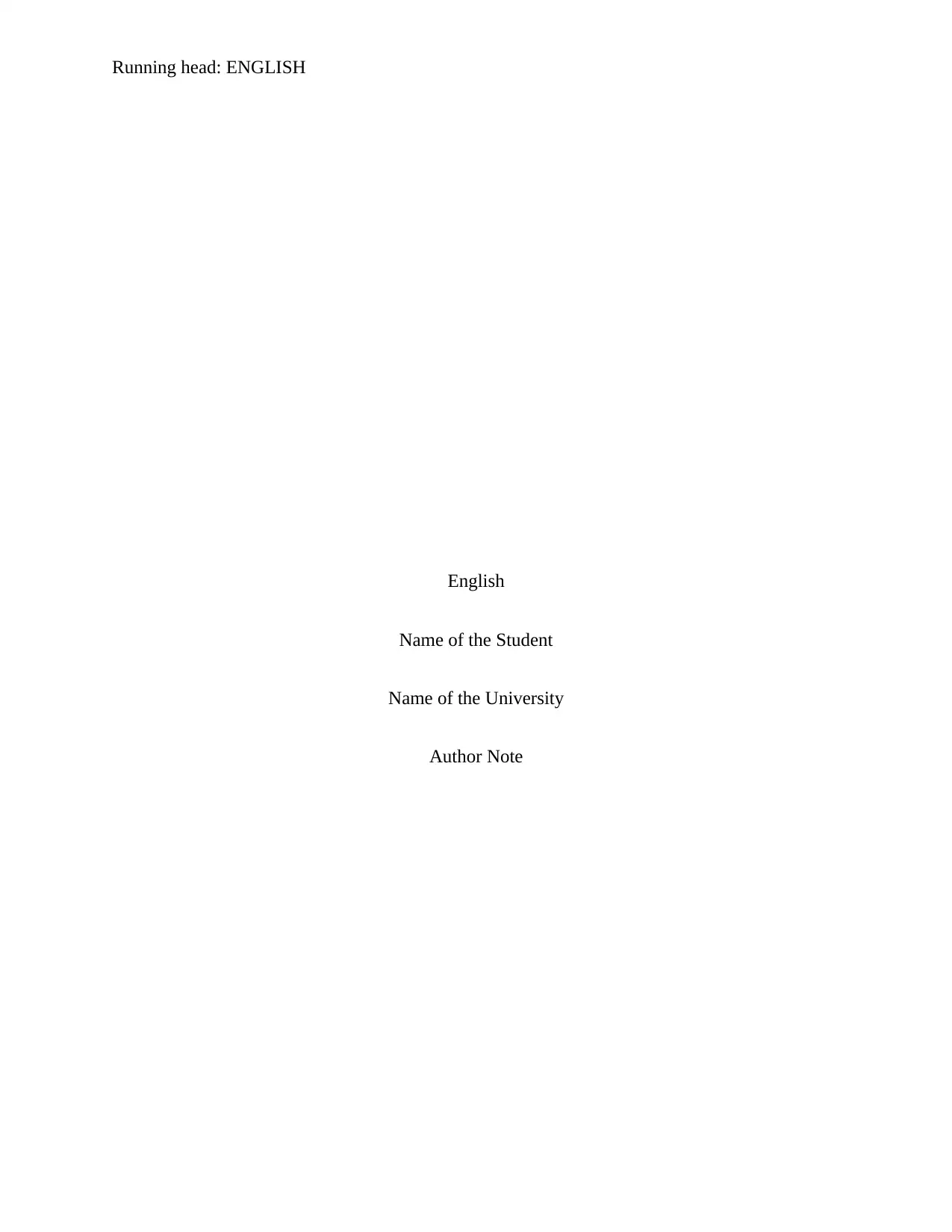
Running head: ENGLISH
English
Name of the Student
Name of the University
Author Note
English
Name of the Student
Name of the University
Author Note
Paraphrase This Document
Need a fresh take? Get an instant paraphrase of this document with our AI Paraphraser
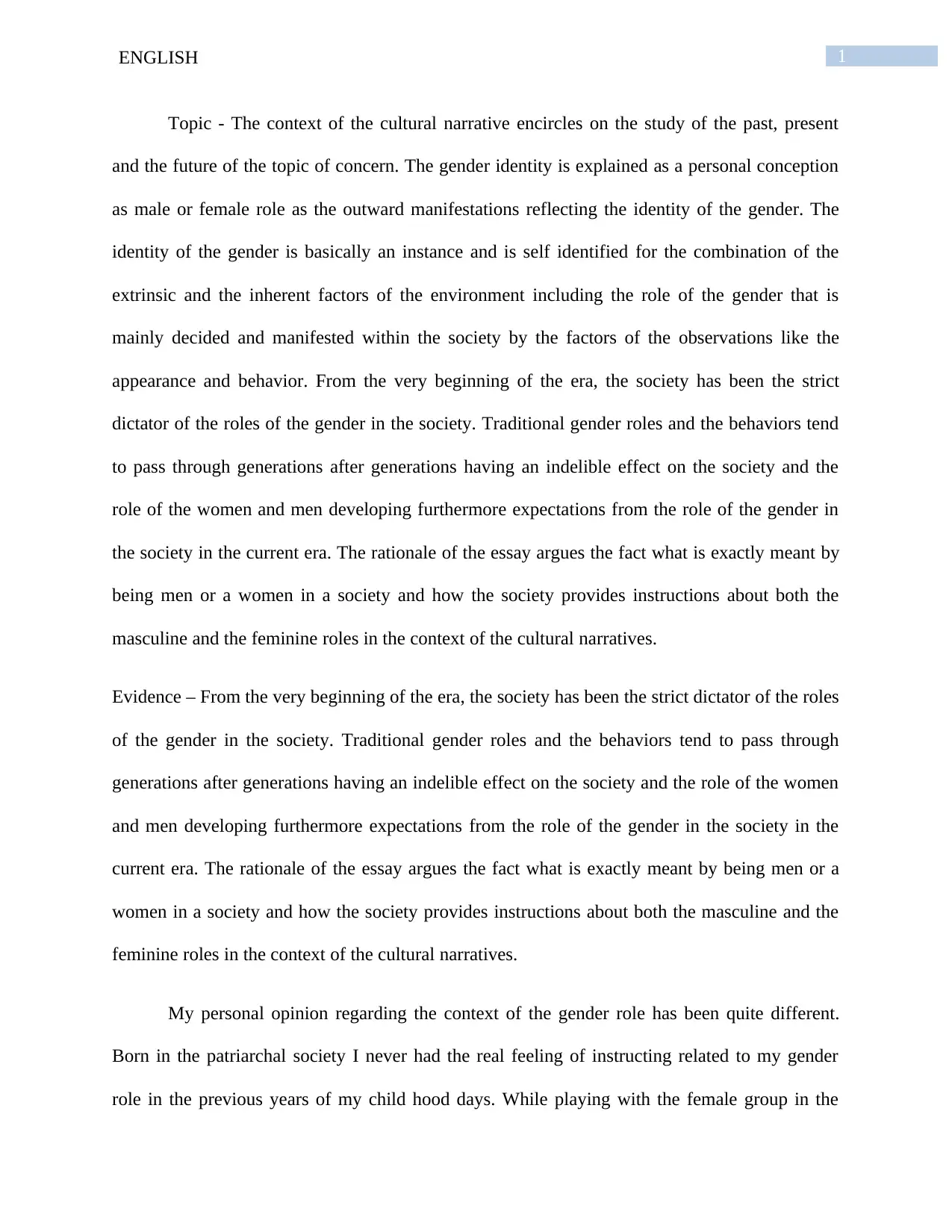
1ENGLISH
Topic - The context of the cultural narrative encircles on the study of the past, present
and the future of the topic of concern. The gender identity is explained as a personal conception
as male or female role as the outward manifestations reflecting the identity of the gender. The
identity of the gender is basically an instance and is self identified for the combination of the
extrinsic and the inherent factors of the environment including the role of the gender that is
mainly decided and manifested within the society by the factors of the observations like the
appearance and behavior. From the very beginning of the era, the society has been the strict
dictator of the roles of the gender in the society. Traditional gender roles and the behaviors tend
to pass through generations after generations having an indelible effect on the society and the
role of the women and men developing furthermore expectations from the role of the gender in
the society in the current era. The rationale of the essay argues the fact what is exactly meant by
being men or a women in a society and how the society provides instructions about both the
masculine and the feminine roles in the context of the cultural narratives.
Evidence – From the very beginning of the era, the society has been the strict dictator of the roles
of the gender in the society. Traditional gender roles and the behaviors tend to pass through
generations after generations having an indelible effect on the society and the role of the women
and men developing furthermore expectations from the role of the gender in the society in the
current era. The rationale of the essay argues the fact what is exactly meant by being men or a
women in a society and how the society provides instructions about both the masculine and the
feminine roles in the context of the cultural narratives.
My personal opinion regarding the context of the gender role has been quite different.
Born in the patriarchal society I never had the real feeling of instructing related to my gender
role in the previous years of my child hood days. While playing with the female group in the
Topic - The context of the cultural narrative encircles on the study of the past, present
and the future of the topic of concern. The gender identity is explained as a personal conception
as male or female role as the outward manifestations reflecting the identity of the gender. The
identity of the gender is basically an instance and is self identified for the combination of the
extrinsic and the inherent factors of the environment including the role of the gender that is
mainly decided and manifested within the society by the factors of the observations like the
appearance and behavior. From the very beginning of the era, the society has been the strict
dictator of the roles of the gender in the society. Traditional gender roles and the behaviors tend
to pass through generations after generations having an indelible effect on the society and the
role of the women and men developing furthermore expectations from the role of the gender in
the society in the current era. The rationale of the essay argues the fact what is exactly meant by
being men or a women in a society and how the society provides instructions about both the
masculine and the feminine roles in the context of the cultural narratives.
Evidence – From the very beginning of the era, the society has been the strict dictator of the roles
of the gender in the society. Traditional gender roles and the behaviors tend to pass through
generations after generations having an indelible effect on the society and the role of the women
and men developing furthermore expectations from the role of the gender in the society in the
current era. The rationale of the essay argues the fact what is exactly meant by being men or a
women in a society and how the society provides instructions about both the masculine and the
feminine roles in the context of the cultural narratives.
My personal opinion regarding the context of the gender role has been quite different.
Born in the patriarchal society I never had the real feeling of instructing related to my gender
role in the previous years of my child hood days. While playing with the female group in the
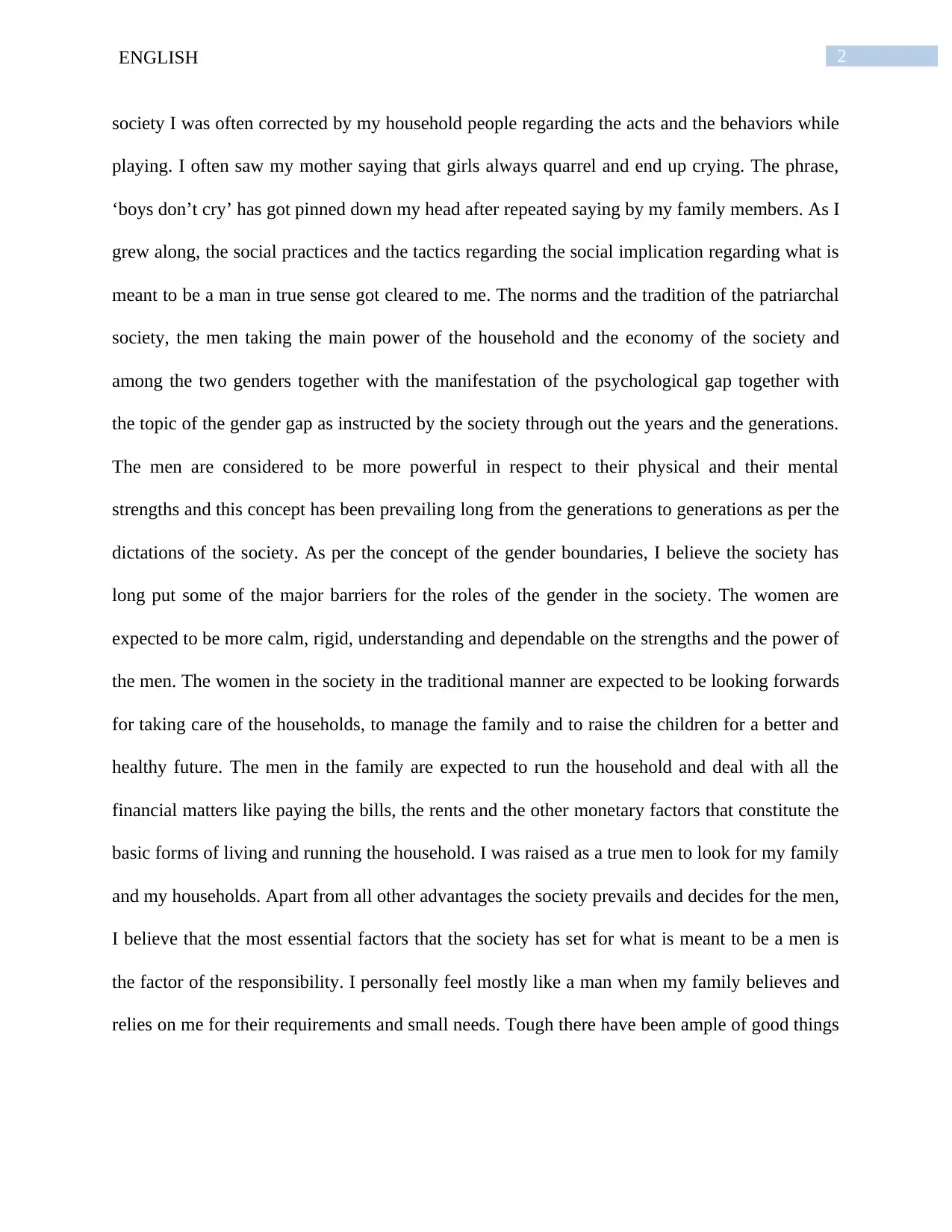
2ENGLISH
society I was often corrected by my household people regarding the acts and the behaviors while
playing. I often saw my mother saying that girls always quarrel and end up crying. The phrase,
‘boys don’t cry’ has got pinned down my head after repeated saying by my family members. As I
grew along, the social practices and the tactics regarding the social implication regarding what is
meant to be a man in true sense got cleared to me. The norms and the tradition of the patriarchal
society, the men taking the main power of the household and the economy of the society and
among the two genders together with the manifestation of the psychological gap together with
the topic of the gender gap as instructed by the society through out the years and the generations.
The men are considered to be more powerful in respect to their physical and their mental
strengths and this concept has been prevailing long from the generations to generations as per the
dictations of the society. As per the concept of the gender boundaries, I believe the society has
long put some of the major barriers for the roles of the gender in the society. The women are
expected to be more calm, rigid, understanding and dependable on the strengths and the power of
the men. The women in the society in the traditional manner are expected to be looking forwards
for taking care of the households, to manage the family and to raise the children for a better and
healthy future. The men in the family are expected to run the household and deal with all the
financial matters like paying the bills, the rents and the other monetary factors that constitute the
basic forms of living and running the household. I was raised as a true men to look for my family
and my households. Apart from all other advantages the society prevails and decides for the men,
I believe that the most essential factors that the society has set for what is meant to be a men is
the factor of the responsibility. I personally feel mostly like a man when my family believes and
relies on me for their requirements and small needs. Tough there have been ample of good things
society I was often corrected by my household people regarding the acts and the behaviors while
playing. I often saw my mother saying that girls always quarrel and end up crying. The phrase,
‘boys don’t cry’ has got pinned down my head after repeated saying by my family members. As I
grew along, the social practices and the tactics regarding the social implication regarding what is
meant to be a man in true sense got cleared to me. The norms and the tradition of the patriarchal
society, the men taking the main power of the household and the economy of the society and
among the two genders together with the manifestation of the psychological gap together with
the topic of the gender gap as instructed by the society through out the years and the generations.
The men are considered to be more powerful in respect to their physical and their mental
strengths and this concept has been prevailing long from the generations to generations as per the
dictations of the society. As per the concept of the gender boundaries, I believe the society has
long put some of the major barriers for the roles of the gender in the society. The women are
expected to be more calm, rigid, understanding and dependable on the strengths and the power of
the men. The women in the society in the traditional manner are expected to be looking forwards
for taking care of the households, to manage the family and to raise the children for a better and
healthy future. The men in the family are expected to run the household and deal with all the
financial matters like paying the bills, the rents and the other monetary factors that constitute the
basic forms of living and running the household. I was raised as a true men to look for my family
and my households. Apart from all other advantages the society prevails and decides for the men,
I believe that the most essential factors that the society has set for what is meant to be a men is
the factor of the responsibility. I personally feel mostly like a man when my family believes and
relies on me for their requirements and small needs. Tough there have been ample of good things
⊘ This is a preview!⊘
Do you want full access?
Subscribe today to unlock all pages.

Trusted by 1+ million students worldwide
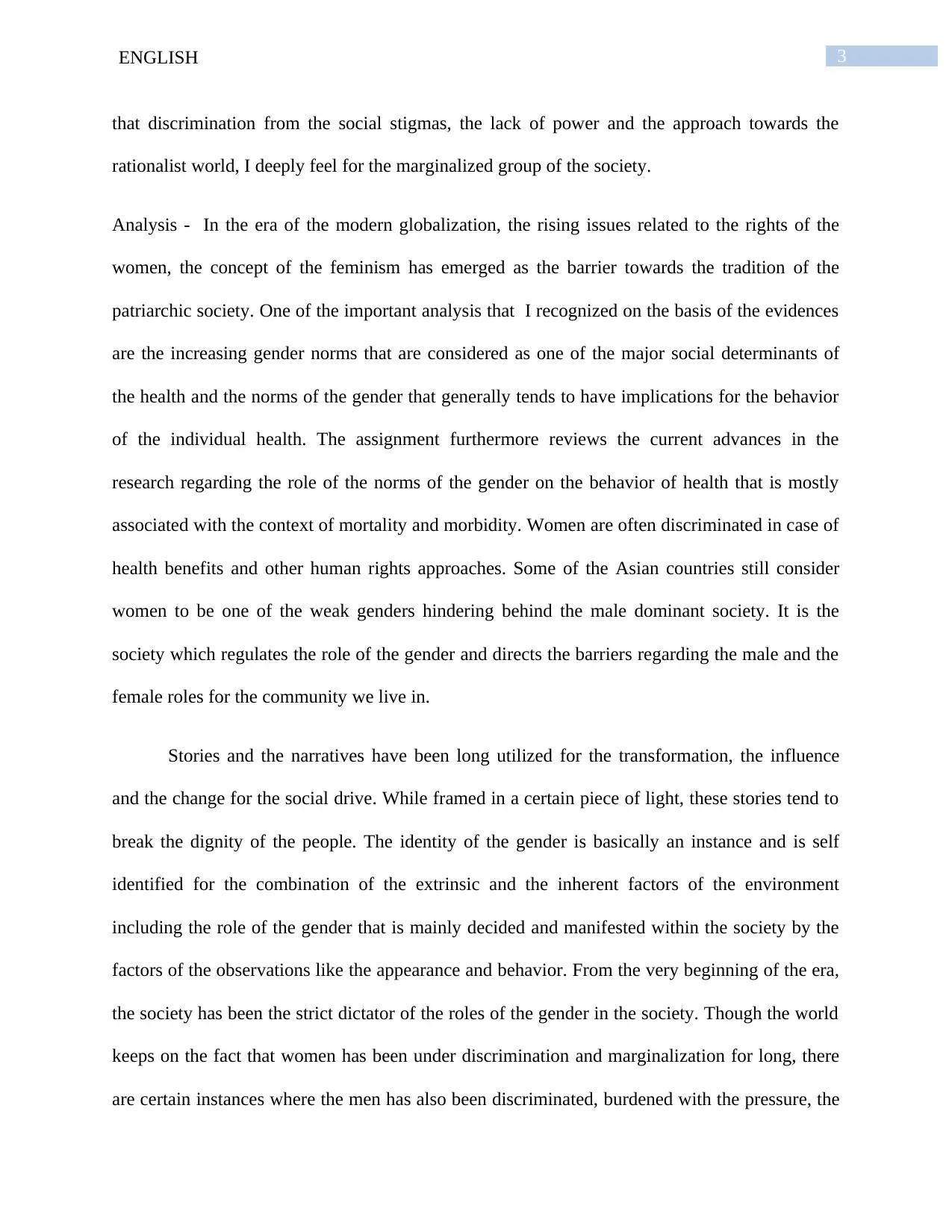
3ENGLISH
that discrimination from the social stigmas, the lack of power and the approach towards the
rationalist world, I deeply feel for the marginalized group of the society.
Analysis - In the era of the modern globalization, the rising issues related to the rights of the
women, the concept of the feminism has emerged as the barrier towards the tradition of the
patriarchic society. One of the important analysis that I recognized on the basis of the evidences
are the increasing gender norms that are considered as one of the major social determinants of
the health and the norms of the gender that generally tends to have implications for the behavior
of the individual health. The assignment furthermore reviews the current advances in the
research regarding the role of the norms of the gender on the behavior of health that is mostly
associated with the context of mortality and morbidity. Women are often discriminated in case of
health benefits and other human rights approaches. Some of the Asian countries still consider
women to be one of the weak genders hindering behind the male dominant society. It is the
society which regulates the role of the gender and directs the barriers regarding the male and the
female roles for the community we live in.
Stories and the narratives have been long utilized for the transformation, the influence
and the change for the social drive. While framed in a certain piece of light, these stories tend to
break the dignity of the people. The identity of the gender is basically an instance and is self
identified for the combination of the extrinsic and the inherent factors of the environment
including the role of the gender that is mainly decided and manifested within the society by the
factors of the observations like the appearance and behavior. From the very beginning of the era,
the society has been the strict dictator of the roles of the gender in the society. Though the world
keeps on the fact that women has been under discrimination and marginalization for long, there
are certain instances where the men has also been discriminated, burdened with the pressure, the
that discrimination from the social stigmas, the lack of power and the approach towards the
rationalist world, I deeply feel for the marginalized group of the society.
Analysis - In the era of the modern globalization, the rising issues related to the rights of the
women, the concept of the feminism has emerged as the barrier towards the tradition of the
patriarchic society. One of the important analysis that I recognized on the basis of the evidences
are the increasing gender norms that are considered as one of the major social determinants of
the health and the norms of the gender that generally tends to have implications for the behavior
of the individual health. The assignment furthermore reviews the current advances in the
research regarding the role of the norms of the gender on the behavior of health that is mostly
associated with the context of mortality and morbidity. Women are often discriminated in case of
health benefits and other human rights approaches. Some of the Asian countries still consider
women to be one of the weak genders hindering behind the male dominant society. It is the
society which regulates the role of the gender and directs the barriers regarding the male and the
female roles for the community we live in.
Stories and the narratives have been long utilized for the transformation, the influence
and the change for the social drive. While framed in a certain piece of light, these stories tend to
break the dignity of the people. The identity of the gender is basically an instance and is self
identified for the combination of the extrinsic and the inherent factors of the environment
including the role of the gender that is mainly decided and manifested within the society by the
factors of the observations like the appearance and behavior. From the very beginning of the era,
the society has been the strict dictator of the roles of the gender in the society. Though the world
keeps on the fact that women has been under discrimination and marginalization for long, there
are certain instances where the men has also been discriminated, burdened with the pressure, the
Paraphrase This Document
Need a fresh take? Get an instant paraphrase of this document with our AI Paraphraser
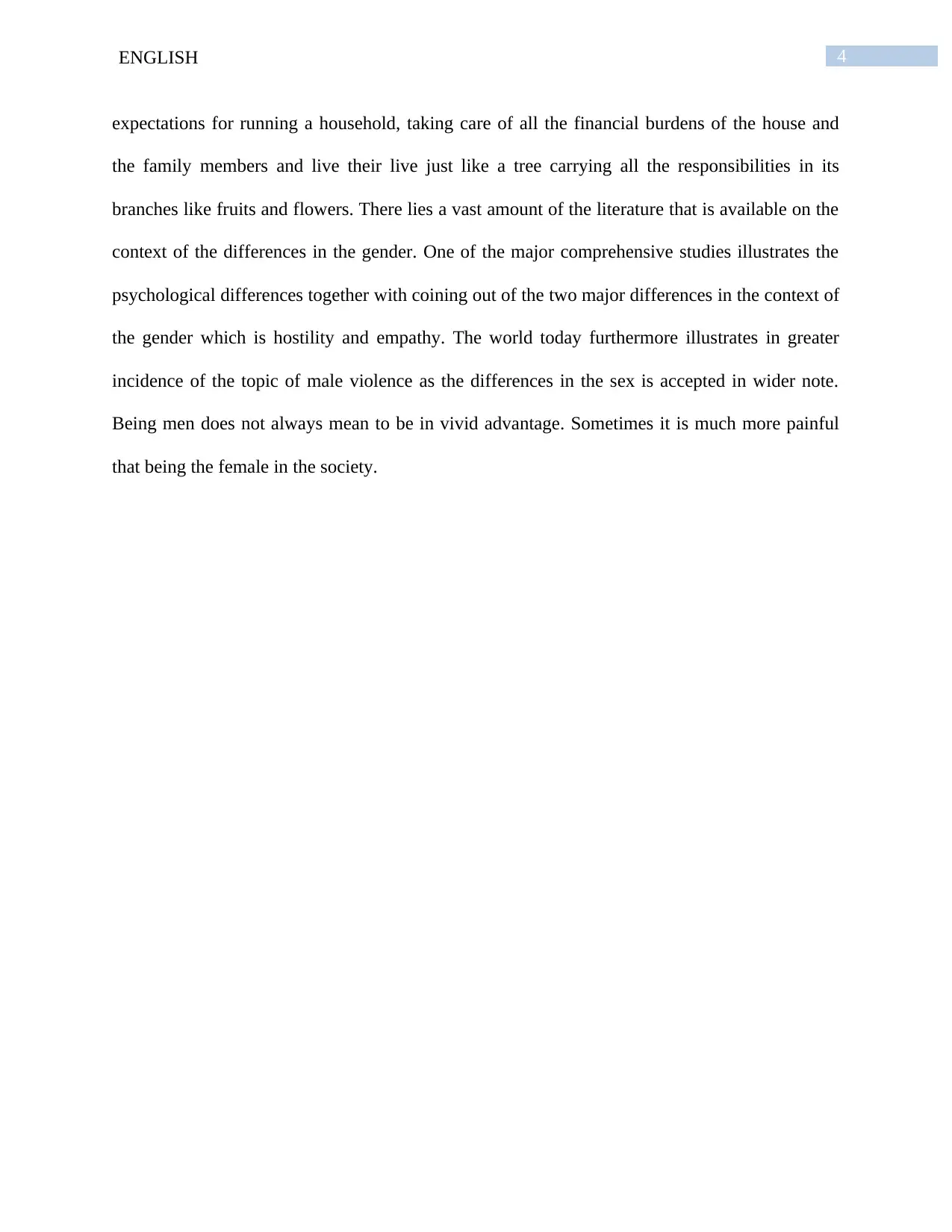
4ENGLISH
expectations for running a household, taking care of all the financial burdens of the house and
the family members and live their live just like a tree carrying all the responsibilities in its
branches like fruits and flowers. There lies a vast amount of the literature that is available on the
context of the differences in the gender. One of the major comprehensive studies illustrates the
psychological differences together with coining out of the two major differences in the context of
the gender which is hostility and empathy. The world today furthermore illustrates in greater
incidence of the topic of male violence as the differences in the sex is accepted in wider note.
Being men does not always mean to be in vivid advantage. Sometimes it is much more painful
that being the female in the society.
expectations for running a household, taking care of all the financial burdens of the house and
the family members and live their live just like a tree carrying all the responsibilities in its
branches like fruits and flowers. There lies a vast amount of the literature that is available on the
context of the differences in the gender. One of the major comprehensive studies illustrates the
psychological differences together with coining out of the two major differences in the context of
the gender which is hostility and empathy. The world today furthermore illustrates in greater
incidence of the topic of male violence as the differences in the sex is accepted in wider note.
Being men does not always mean to be in vivid advantage. Sometimes it is much more painful
that being the female in the society.
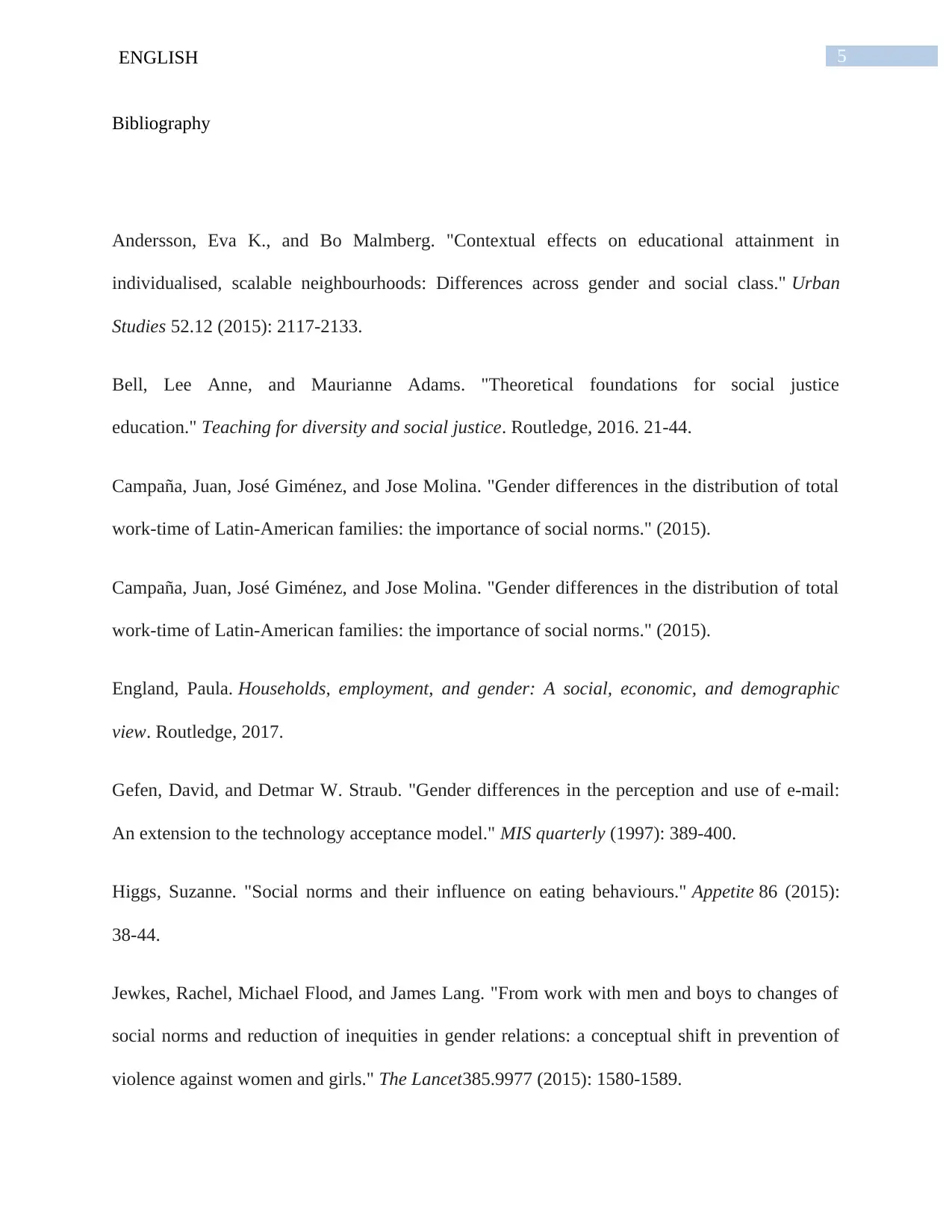
5ENGLISH
Bibliography
Andersson, Eva K., and Bo Malmberg. "Contextual effects on educational attainment in
individualised, scalable neighbourhoods: Differences across gender and social class." Urban
Studies 52.12 (2015): 2117-2133.
Bell, Lee Anne, and Maurianne Adams. "Theoretical foundations for social justice
education." Teaching for diversity and social justice. Routledge, 2016. 21-44.
Campaña, Juan, José Giménez, and Jose Molina. "Gender differences in the distribution of total
work-time of Latin-American families: the importance of social norms." (2015).
Campaña, Juan, José Giménez, and Jose Molina. "Gender differences in the distribution of total
work-time of Latin-American families: the importance of social norms." (2015).
England, Paula. Households, employment, and gender: A social, economic, and demographic
view. Routledge, 2017.
Gefen, David, and Detmar W. Straub. "Gender differences in the perception and use of e-mail:
An extension to the technology acceptance model." MIS quarterly (1997): 389-400.
Higgs, Suzanne. "Social norms and their influence on eating behaviours." Appetite 86 (2015):
38-44.
Jewkes, Rachel, Michael Flood, and James Lang. "From work with men and boys to changes of
social norms and reduction of inequities in gender relations: a conceptual shift in prevention of
violence against women and girls." The Lancet385.9977 (2015): 1580-1589.
Bibliography
Andersson, Eva K., and Bo Malmberg. "Contextual effects on educational attainment in
individualised, scalable neighbourhoods: Differences across gender and social class." Urban
Studies 52.12 (2015): 2117-2133.
Bell, Lee Anne, and Maurianne Adams. "Theoretical foundations for social justice
education." Teaching for diversity and social justice. Routledge, 2016. 21-44.
Campaña, Juan, José Giménez, and Jose Molina. "Gender differences in the distribution of total
work-time of Latin-American families: the importance of social norms." (2015).
Campaña, Juan, José Giménez, and Jose Molina. "Gender differences in the distribution of total
work-time of Latin-American families: the importance of social norms." (2015).
England, Paula. Households, employment, and gender: A social, economic, and demographic
view. Routledge, 2017.
Gefen, David, and Detmar W. Straub. "Gender differences in the perception and use of e-mail:
An extension to the technology acceptance model." MIS quarterly (1997): 389-400.
Higgs, Suzanne. "Social norms and their influence on eating behaviours." Appetite 86 (2015):
38-44.
Jewkes, Rachel, Michael Flood, and James Lang. "From work with men and boys to changes of
social norms and reduction of inequities in gender relations: a conceptual shift in prevention of
violence against women and girls." The Lancet385.9977 (2015): 1580-1589.
⊘ This is a preview!⊘
Do you want full access?
Subscribe today to unlock all pages.

Trusted by 1+ million students worldwide
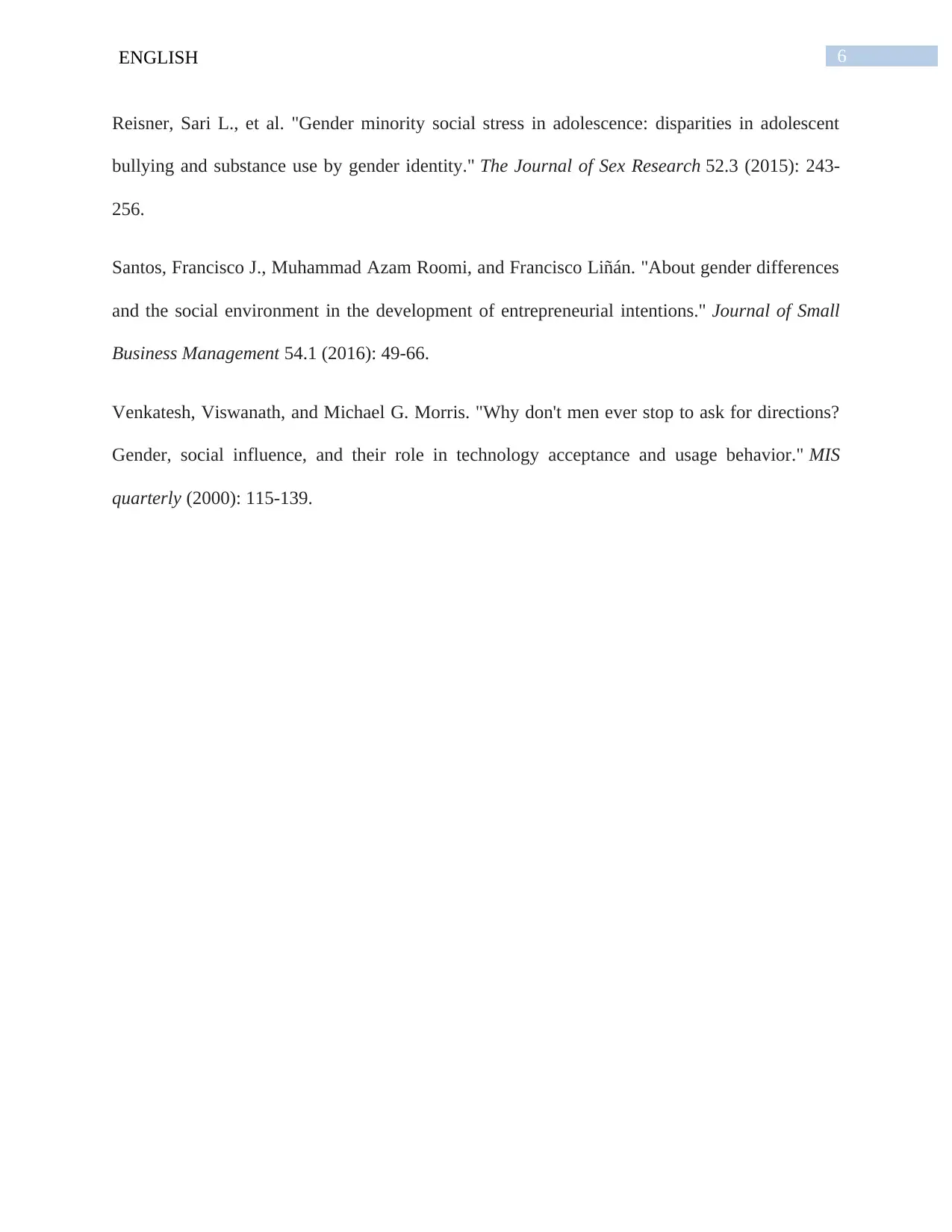
6ENGLISH
Reisner, Sari L., et al. "Gender minority social stress in adolescence: disparities in adolescent
bullying and substance use by gender identity." The Journal of Sex Research 52.3 (2015): 243-
256.
Santos, Francisco J., Muhammad Azam Roomi, and Francisco Liñán. "About gender differences
and the social environment in the development of entrepreneurial intentions." Journal of Small
Business Management 54.1 (2016): 49-66.
Venkatesh, Viswanath, and Michael G. Morris. "Why don't men ever stop to ask for directions?
Gender, social influence, and their role in technology acceptance and usage behavior." MIS
quarterly (2000): 115-139.
Reisner, Sari L., et al. "Gender minority social stress in adolescence: disparities in adolescent
bullying and substance use by gender identity." The Journal of Sex Research 52.3 (2015): 243-
256.
Santos, Francisco J., Muhammad Azam Roomi, and Francisco Liñán. "About gender differences
and the social environment in the development of entrepreneurial intentions." Journal of Small
Business Management 54.1 (2016): 49-66.
Venkatesh, Viswanath, and Michael G. Morris. "Why don't men ever stop to ask for directions?
Gender, social influence, and their role in technology acceptance and usage behavior." MIS
quarterly (2000): 115-139.
1 out of 7
Your All-in-One AI-Powered Toolkit for Academic Success.
+13062052269
info@desklib.com
Available 24*7 on WhatsApp / Email
![[object Object]](/_next/static/media/star-bottom.7253800d.svg)
Unlock your academic potential
Copyright © 2020–2025 A2Z Services. All Rights Reserved. Developed and managed by ZUCOL.

